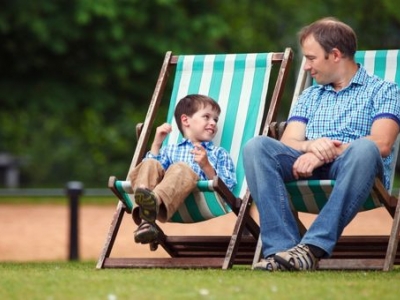
Five ways to model grace-dependence
Helpful tips on showing your kids what relying on Christ looks like.
I hope these tips will you model a grace-dependent life to your children. As they imitate you, they in turn will grow more dependent on the same grace in their own lives.
1. Say ‘sorry’ first
When I get angry with our kids, I can often see very clearly what they need to say sorry for but I can be less willing to admit my own fault. I may not have started it but I may have exacerbated it. Rather than demanding, ‘You need to say sorry to me!’ it is more helpful to initiate a resolution by apologising for getting angry and shouting.
2. Ask for forgiveness
There’s something about saying, ‘Would you please forgive me?’ that is so much harder to say than ‘I’m sorry’. I think it has to do with the loss of power that the request for forgiveness involves. It’s also a question that requires a response. The declaration ‘I’m sorry’ can end up floating into the air with no particular response required. But to ask, ‘Will you forgive me?’ needs a yes or no. Either way, the conversation is moving forward.
3. Let your children see you repent and forgive each other
Adults not only sin against children, we also sin against one another. Our fights aren’t secret; our repentance and forgiveness shouldn’t be either. We don’t want to model to our children that fights get resolved by ignoring them and pretending they didn’t happen. This doesn’t mean we should be holding the reconciliation talk over the dinner table but it may be appropriate to let our children know that we’re going off to talk over our disagreement, or to let them know about how we resolved the fight.
4. Let your children see that we depend on God
On the mornings that I win the discipline battle to get out of bed when the alarm goes off, I sit on a chair on our back verandah to read my Bible and pray. Our son wakes up early most mornings and so he often sees me sitting out there. Sometimes he comes out and asks me what I’m doing. Rather than find a place where I won’t be disturbed and rather than stopping when he interrupts so I can help him get breakfast, it’s a good opportunity to model that I need to listen to God in the Bible and I need to pray.
5. Say ‘we’ in bedtime prayers of thanks and repentance
Our son learnt the ‘teaspoon prayer’ model at Sunday School: tsp = thankyou, sorry, please. Sorry is the part he finds most difficult! Often it’s a catch-all ‘sorry for all the bad things I’ve been doing’ which makes up in comprehensiveness for what it may lack in sincerity! To help overcome that I’ve been trying to use the same model using ‘we’ instead of just ‘I’. Using ‘we’ helps to think about things that he and I have enjoyed together. And by saying sorry for things we have both been involved in (such as, ‘We’re sorry that we had a fight about clearing the table’), I’m able to help him learn the sort of things that we all need forgiveness for as well as modeling my own need for repentance.
For more articles from Growing Faith, subscribe to our monthly e-newsletter.
To hear about the latest books and resources from Youthworks Media, subscribe here.







